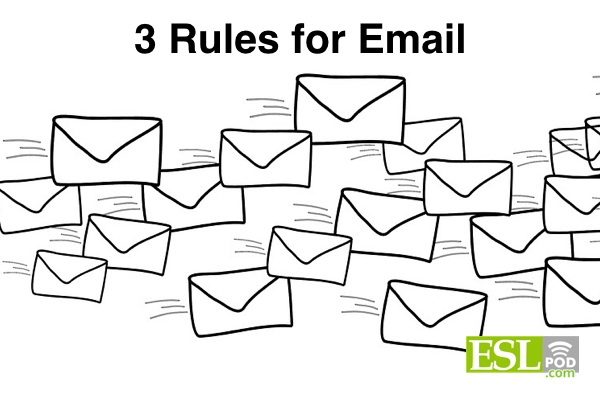 The Wall Street Journal recently ran (published) an article on how you can use your email better. They cite (talk about; mention) a lot of recent scientific studies on using email.
The Wall Street Journal recently ran (published) an article on how you can use your email better. They cite (talk about; mention) a lot of recent scientific studies on using email.
Let’s talk about three of them, and learn some useful English along the way (as we do it).
1. “Don’t answer too quickly – or after hours.”
Some people think they should answer emails as soon as they arrive in their inboxes. But studies say that this actually makes people “less productive, more stressed, . . . and more reactive.”
What do those three terms mean?
To be productive means to get things done efficiently, using the least amount of time. Answering email immediately makes people LESS productive – they get less done.
This may be due to (because of) the brain being unable to switch (change) easily back and forth between tasks (things to do). Each time we change our focus (what we’re thinking about), there is a cost (negative impact) to our concentration (ability to work on one thing with focus).
To be stressed means to feel under pressure, to be anxious over the amount of work you have or some negative situation you’re experiencing.
Reactive means you are simply doing the things that other people want you to do. You are letting other people control your agenda (your tasks; what you want to get done). The opposite of reactive is proactive.
Some researchers also suggest not answering emails after hours. After hours means after your normal workday has ended (at night, on weekends). The reason has to do in part with the need for you to “take a break” from your work in order to be able to focus properly during the day.
Answering emails after hours also means that the people you are responding to may answer you back. Now you have to respond back to them again – it never ends!
2. Send email in the morning, early in the week.
Take a look at your inbox. Regardless (No matter) what software you use, it is very likely that the most recent emails are on the top of your inbox. You see those first.
If you want people to pay attention to your email quickly, then, you want to send it to them close to the time they are checking their email. That way, your email will be near the top of their list of emails.
And when do most people check their email? That’s right: between 8AM and noon (12PM).
That’s why mornings are best for email.
People are also more likely to respond to emails sent early in the week – that is, Monday and Tuesday. We all feel like we should “get things done” when the workweek (usually Monday through Friday) begins.
Monday morning is a good time to send someone an email, then.
3. Use ALL CAPS and emoticons/emojis ( 🙂 ) wisely.
All caps means all capital or “large” letters, LIKE THIS. Some people say you should never use all caps, because it conveys (communicates) anger or shouting.
But sometimes it’s okay to use all caps, especially when you are trying to emphasize something that people might misread or misunderstand.
For example, I might tell you in an email that you should NOT spend time trying to memorize vocabulary words. Many people waste their time this way, so I put the “not” in all caps to make sure they notice it.
(I like to bold words for emphasis also in emails.)
Emoticons or emojis are new additions to our written communication. They are of course things like 🙂 or 🙁 or small pictures.
Should you use emojis with friends?
Yes, according to (say) some researchers, who think that people feel more emotionally connected and positive when emails (or text messages) contain emojis.
Should you use emojis at work or with strangers (people you do not know)?
No. Some studies have found that using emojis in a business email, or with people you don’t know, can cause the person reading your email to think you are, well, perhaps not very competent (good at your job) or intelligent.
It’s too informal and therefore considered inappropriate (not correct for the situation).
Okay, I’m writing this in the morning, so I have to go check my email!
~Jeff
Twitter: http://www.twitter.com/eslpod?
Learn English Magazine: http://www.learnenglishmag.com (free Apple/Android app)
Want to comment on this blog post? You can now do that on our Facebook page – click here to comment on this post!

 The Wall Street Journal recently ran (published) an article on how you can use your email better. They cite (talk about; mention) a lot of recent scientific studies on using email.
The Wall Street Journal recently ran (published) an article on how you can use your email better. They cite (talk about; mention) a lot of recent scientific studies on using email. My mother used to tell us, “If you don’t have anything nice to say, don’t say anything at all.”
My mother used to tell us, “If you don’t have anything nice to say, don’t say anything at all.” Every city has particular characteristics that shape (change) the people who live there. It may be the size of the city, the culture of the city, the geography (where things are) of the city, the history of the city – all these can change the way people live and act.
Every city has particular characteristics that shape (change) the people who live there. It may be the size of the city, the culture of the city, the geography (where things are) of the city, the history of the city – all these can change the way people live and act.
 Have you been watching the Olympics?
Have you been watching the Olympics?